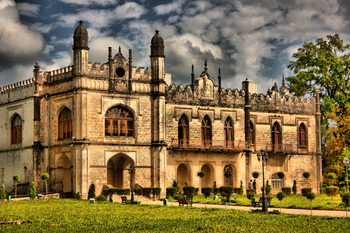Dadiani Palace: Difference between revisions
Ghirlandajo (talk | contribs) m Ghirlandajo moved page Dadiani Palaces Museum to Dadiani Palace |
|||
| Line 34: | Line 34: | ||
==History== |
==History== |
||
[[File:Akaki Chanturia.jpg|thumb|left|130px|Akaki Chanturia, the founder of the Museum]] |
[[File:Akaki Chanturia.jpg|thumb|left|130px|Akaki Chanturia, the founder of the Museum]] |
||
The first exhibition, of archaeological excavations of the ancient city of Nakalakevi was prepared by [[Samegrelo|Megrelian]] [[Dadiani|prince]] [[:ru:Дадиани, Давид Леванович|David Dadiani]] and took place in 1840.<ref name="dp"/> Three palaces form the modern museum complex, parts of which are also |
The first exhibition, of archaeological excavations of the ancient city of Nakalakevi was prepared by [[Samegrelo|Megrelian]] [[Dadiani|prince]] [[:ru:Дадиани, Давид Леванович|David Dadiani]] and took place in 1840.<ref name="dp"/> Three palaces form the modern museum complex, parts of which are also Blachernae Virgin Church and [[Zugdidi Botanical Garden]].<ref name="dp"/> The Dadiani Palaces History and Architecture Museum houses some exhibits of natural cultural heritage of Georgia – Tagiloni treasure materials, Mother of God holy vesture, the icon of queen [[Burdukhan of Alania|Bordokhan]] – mother of queen [[Tamar of Georgia]], manuscripts from 13th – 14th centuries, miniatures, memorial relics of Dadiani dynasty, and objects connected to emperor of [[France]] [[Napoleon Bonaparte]] – brought to the palace by the husband of David Dadiani's daughter, prince Achille Murat, grandson of Napoleon's sister, Carolina.<ref name="dp"/> |
||
The palace was fully transformed into a museum on May 1, 1921, at the initiative of Georgian ethnographer and geologist [[Akaki Chanturia]]. |
The palace was fully transformed into a museum on May 1, 1921, at the initiative of Georgian ethnographer and geologist [[Akaki Chanturia]]. |
||
Revision as of 20:19, 31 May 2014
დადიანების სასახლეთა მუზეუმი | |
 Palace of Ekaterine Dadiani, Princess of Samegrelo. | |
 | |
| Established | Year 1840 |
|---|---|
| Location | Palace of Princess Ekaterine Chavchavadze-Dadiani, 2, Zviad Gamsakhurdia str., Zugdidi, Georgia |
| Type | Art museum, Design/Textile Museum, Historic site |
| Website | georgianmuseums.ge |
Dadiani Palaces History and Architectural Museum (Georgian: დადიანების სასახლეთა ისტორიულ-არქიტექტურული მუზეუმი) is a Georgian national museum located in Zugdidi, Samegrelo-Zemo Svaneti region, Georgia.[1] The Dadiani Palaces History and Architecture Museum is considered to be one of the most eminent palaces in Caucasus.[1]
History

The first exhibition, of archaeological excavations of the ancient city of Nakalakevi was prepared by Megrelian prince David Dadiani and took place in 1840.[1] Three palaces form the modern museum complex, parts of which are also Blachernae Virgin Church and Zugdidi Botanical Garden.[1] The Dadiani Palaces History and Architecture Museum houses some exhibits of natural cultural heritage of Georgia – Tagiloni treasure materials, Mother of God holy vesture, the icon of queen Bordokhan – mother of queen Tamar of Georgia, manuscripts from 13th – 14th centuries, miniatures, memorial relics of Dadiani dynasty, and objects connected to emperor of France Napoleon Bonaparte – brought to the palace by the husband of David Dadiani's daughter, prince Achille Murat, grandson of Napoleon's sister, Carolina.[1]
The palace was fully transformed into a museum on May 1, 1921, at the initiative of Georgian ethnographer and geologist Akaki Chanturia.
Archaeological collection

In early 1848 the prince of Samegrelo, David Dadiani, used to show his guests the archaeological and numismatic collection from Nokalakevi, an archaeological site in Samegrelo. Some of the exhibits were found by David Dadiani himself, and some were purchased by him from settlers in his domain. The most important archaeological dig by David Dadiani was the research of Nokalakevi – known as Archeopolis in Antiquity.
